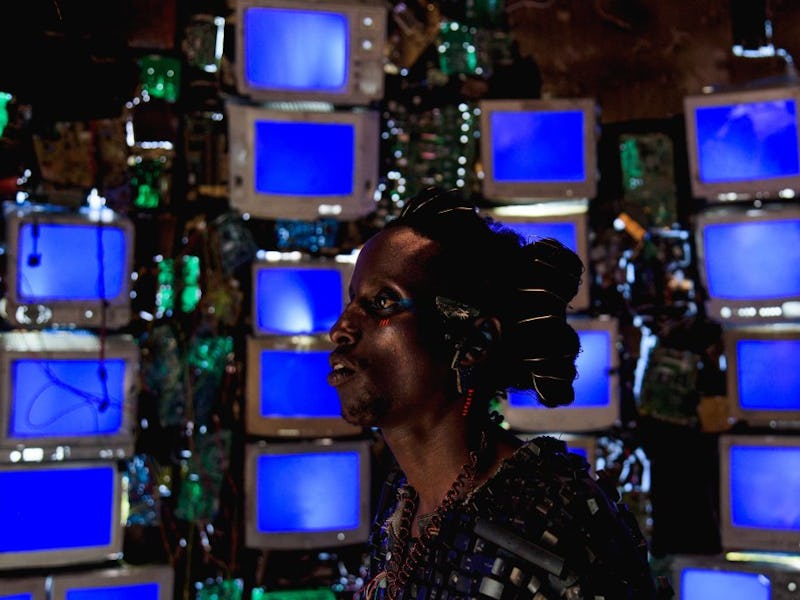Neptune Frost review: The most dazzling sci-fi musical of the year is here
Philosophically frustrating but aurally brilliant, this strange beauty of a film will keep you captivated.

Where do the minerals that power your electronics come from? You probably don’t think about it, because a little research will tell you it’s not a pleasant subject. But their origin — and the human cost of delivering them to you — are what the ambitious and pointed Neptune Frost forces you to confront.
Likely the only Afrofuturist sci-fi punk musical you’ll catch this year, Neptune Frost has a lot on its mind, occasionally to the point of overwhelming itself. Filmed in Rwanda by co-directors Anisia Uzeyman and Saul Williams (the former a Rwandan actress and director, the latter an American rapper and writer), it’s a dreamy and minimalist meander through post-colonial politics.
Matalusa (Bertrand Ninteretse) is a coltan miner whose brother is beaten to death by a guard. The intersex Neptune (played first by Elvis Ngabo, then Cheryl Isheja) is on the run after killing a handsy priest. They, and others, are drawn to a mysterious village built from electronic waste after being visited in their dreams by the mystical Wheel-Man (presumably a reference to the classic spiritual “Ezekiel Saw the Wheel”), who encourages them to form a collective and challenge the systems that make up the world.
The miner becomes the hacker Martyr Loser King (get it?), and what follows is something akin to The Matrix as filtered through Koyaanisqatsi. “Hack into land rights and ownership” is not a subtle message, but the vague hacking — and a brewing revolution against a vague post-war “Authority” — is left offscreen as our heroes opine on gender, religion, capital, labor, technology, and time in-between shots of natural beauty.
Among its many other ambitions, Neptune Frost is a subtle love story.
At best, there are thoughtful reflections on how our interconnected world exploits the people who power it. At worst, the dialogue devolves into a mishmash of buzzwords. For better or worse, this is a movie where characters are named Psychology and Memory, and where the viewer is asked, “Maybe you’re asking yourself WTF is this? Is it a poet’s idea of a dream?”
If the philosophy is scattershot, the sensuality is on point. The music is varied and catchy, from the rhythms of mining equipment becoming the basis for the film’s first musical number to a blistering political rap near its climax. Even if you’re struggling to decipher the story, you’ll find yourself humming along. Neptune Frost has roots in Williams’ blunt 2016 album MartyrLoserKing, and the project was also envisioned as both a stage musical and a graphic novel (the latter, announced in 2013, is supposedly still coming out) before it found its way to film.
Visually, it was the right decision. Neptune Frost is a gorgeous film full of subtle cyberpunk accoutrements. Futuristic phones look like Apple’s first take on a Star Trek communicator, and a suit is made of keys ripped from a keyboard. The village where outcasts wash up is full of tents covered in circuit boards and huts full of old CRT monitors, abandoned technology being reclaimed and repurposed. And the costumes, from artist and production designer Cedric Mizero, create a colorful and slightly surreal world where old bicycle wheels and stray wires merge into clothing.
Neptune Frost’s philosophy is hit or miss, but the music and visuals will stick with you.
Neptune Frost also has a compelling eye for human bodies. How they move, how they touch, and how they respond to music. At times, the bodies merge with streams of data and explosions of color, creating some of the film’s most remarkable visuals. It’s a reminder that everything you consume in this world is made by someone and that you have a connection to them whether you like it or not.
The end result is memorable, giving sci-fi something it hasn’t quite seen before. It’s sometimes too vague for its own good. But even if the finer points of Neptune Frost’s attempt to use computers as a metaphor for people and the societies they build are muddled, there’s no mistaking the thesis statement. “We fuel the machine,” viewers are told, and that human fuel isn’t going to be silently consumed.
Neptune Frost is now playing in select theaters.